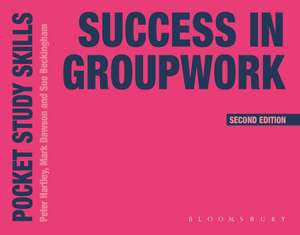Success in Groupwork: Pocket Study Skills
Autor Peter Hartley, Mark Dawson, Sue Beckinghamen Limba Engleză Paperback – 23 mar 2022
Din seria Pocket Study Skills
- 8%
 Preț: 52.69 lei
Preț: 52.69 lei - 24%
 Preț: 52.25 lei
Preț: 52.25 lei - 8%
 Preț: 52.69 lei
Preț: 52.69 lei -
 Preț: 57.50 lei
Preț: 57.50 lei - 8%
 Preț: 52.69 lei
Preț: 52.69 lei - 9%
 Preț: 52.25 lei
Preț: 52.25 lei - 8%
 Preț: 53.57 lei
Preț: 53.57 lei - 8%
 Preț: 53.13 lei
Preț: 53.13 lei - 8%
 Preț: 52.87 lei
Preț: 52.87 lei - 24%
 Preț: 52.25 lei
Preț: 52.25 lei - 18%
 Preț: 52.69 lei
Preț: 52.69 lei - 9%
 Preț: 51.80 lei
Preț: 51.80 lei - 8%
 Preț: 52.77 lei
Preț: 52.77 lei - 8%
 Preț: 52.69 lei
Preț: 52.69 lei -
 Preț: 59.81 lei
Preț: 59.81 lei -
 Preț: 53.22 lei
Preț: 53.22 lei - 9%
 Preț: 51.80 lei
Preț: 51.80 lei - 8%
 Preț: 52.69 lei
Preț: 52.69 lei - 8%
 Preț: 52.59 lei
Preț: 52.59 lei - 9%
 Preț: 52.25 lei
Preț: 52.25 lei - 8%
 Preț: 52.69 lei
Preț: 52.69 lei - 8%
 Preț: 53.06 lei
Preț: 53.06 lei - 9%
 Preț: 52.41 lei
Preț: 52.41 lei -
 Preț: 57.40 lei
Preț: 57.40 lei -
 Preț: 52.69 lei
Preț: 52.69 lei - 23%
 Preț: 53.22 lei
Preț: 53.22 lei
Preț: 52.68 lei
Preț vechi: 64.95 lei
-19% Nou
Puncte Express: 79
Preț estimativ în valută:
10.08€ • 10.95$ • 8.47£
10.08€ • 10.95$ • 8.47£
Carte disponibilă
Livrare economică 01-15 aprilie
Livrare express 15-21 martie pentru 25.72 lei
Preluare comenzi: 021 569.72.76
Specificații
ISBN-13: 9781350933491
ISBN-10: 135093349X
Pagini: 136
Dimensiuni: 138 x 108 x 10 mm
Greutate: 0.09 kg
Ediția:2
Editura: Bloomsbury Publishing
Colecția Bloomsbury Academic
Seria Pocket Study Skills
Locul publicării:London, United Kingdom
ISBN-10: 135093349X
Pagini: 136
Dimensiuni: 138 x 108 x 10 mm
Greutate: 0.09 kg
Ediția:2
Editura: Bloomsbury Publishing
Colecția Bloomsbury Academic
Seria Pocket Study Skills
Locul publicării:London, United Kingdom
Caracteristici
Shows students what to expect from group work and includes pragmatic guidance on coping with the main challenges associated with it, including communication, organisation, workload and conflict
Notă biografică
Peter Hartley is Higher Education Consultant, and Visiting Professor at Edge Hill University, UK, following previous roles as Professor of Education Development at Bradford University, UK and Professor of Communication at Sheffield Hallam University, UK. National Teaching Fellow since 2000, he has promoted technology in education, and developed award-winning software. Alongside educational innovation such as new learning spaces and programme assessment, his longstanding interests in human interaction has produced several popular textbooks: Interpersonal Communication, Group Communication, and most recently a second edition of Business Communication in 2015 Mark Dawson is a 6th Form tutor at King Richard School in Cyprus with a focus on preparing pupils aged 16-18 for their post-secondary options. A qualified Secondary Geography Teacher, he has also previously worked as a Vocational Assessor in Germany and Cyprus, working with young adults to develop their employability/careers prospects and as a Skills Advisor at the University of Bradford, UK supporting students with their academic and interpersonal skill development. He has a MSc in Psychology and holds a PGCHE in addition to his PGCE. Sue Beckingham is a National Teaching Fellow, Principal Lecturer in Business Information Systems and Technology and an Educational Developer at Sheffield Hallam University, UK with a lead role in Learning Teaching and Assessment. She is also a Senior Fellow of the Higher Education Academy, a Fellow of the Staff and Educational Developers Association and a Certified Member of ALT. Her research interests include social media for learning and digital identity, and the use of technology to enhance learning and teaching; she has published and presented this work nationally and internationally as an invited keynote speaker.
Cuprins
Acknowledgements.Introduction.PART I: GETTING READY FOR GROUPWORK.1. Why work in groups at university?2. What do you expect from groupwork?3. The key challenges of groupwork4. What makes groups successful?PART II: CREATING THE TEAM.5. How groups are selected6. The first meeting: getting it right7. Agree your ground rulesPART III: ORGANISING YOUR GROUP.8. Understanding the task9. Team roles10. Organising meetings11. Making decisionsPART IV: RELATIONSHIPS AND COMMUNICATION.12. Analysing what is going on13. Reviewing and revising your ground rules14. Dealing with conflictPART V: ASSESSMENT AND REFLECTION.15. Meeting assessment criteria.16. Reflecting on your experience.17. Writing up your reflection Troubleshooting Guide.References.Index.
